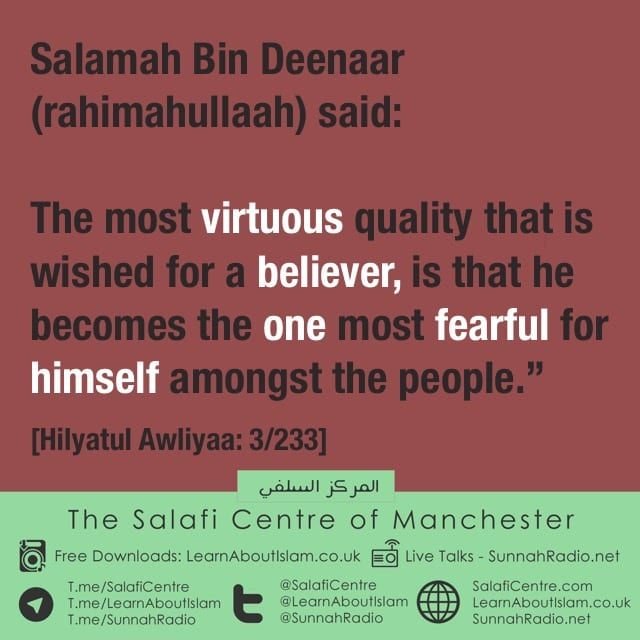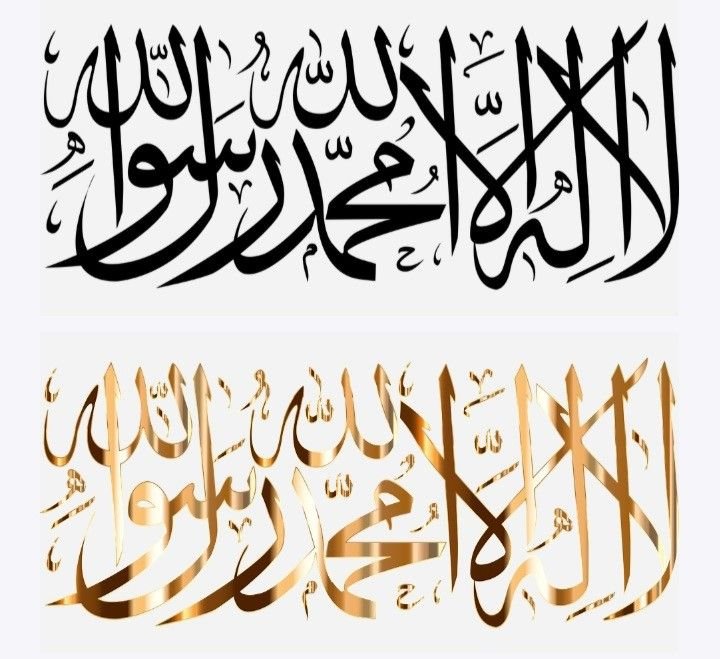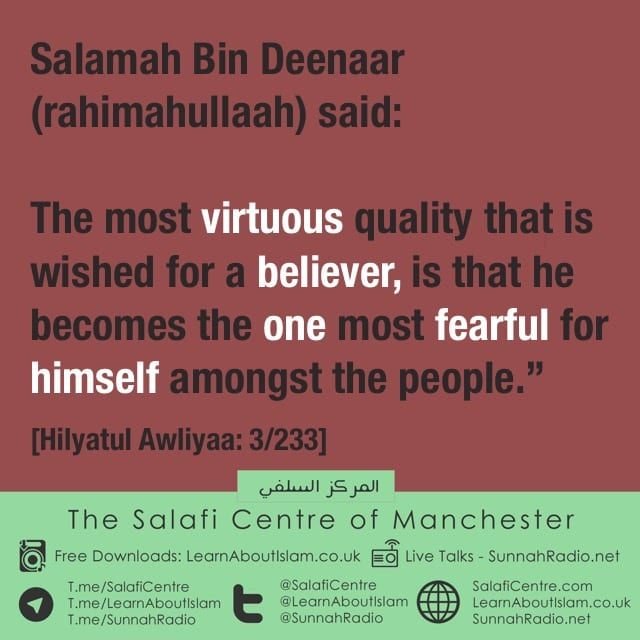[1] An Old Misconception: Those delivering many lessons, teaching and finishing many books outperform their peers!
In The Name of Allah, The Most Merciful, The Bestower of Mercy.
Adherence to The Shariah Is The Goal
Imam Ash-Shatibi, may Allah have mercy upon him, stated:
Know that Allah has established this Shariah as proof against the creation (humankind and jinn) – the old and young alike, the obedient and the disobedient, the righteous and the wicked. He did not specify the proof against anyone in exclusion of another one. Also, all the other revealed laws were established as proof against all the nations to whom they were revealed. The Shariah is the judge- in general, and specifically- the judge on all those who have reached the age of responsibility. It is the path attached to (what Allah has ordained) and it is the Greatest Guide. Have you not heard the statement of Allah, The Most High:
وَكَذَٲلِكَ أَوۡحَيۡنَآ إِلَيۡكَ رُوحً۬ا مِّنۡ أَمۡرِنَاۚ مَا كُنتَ تَدۡرِى مَا ٱلۡكِتَـٰبُ وَلَا ٱلۡإِيمَـٰنُ وَلَـٰكِن جَعَلۡنَـٰهُ نُورً۬ا نَّہۡدِى بِهِۦ مَن نَّشَآءُ مِنۡ عِبَادِنَاۚ وَإِنَّكَ لَتَہۡدِىٓ إِلَىٰ صِرَٲطٍ۬ مُّسۡتَقِيمٍ۬
And thus We have sent to you (O Muhammad) Ruhan (an Inspiration, and a Mercy) of Our Command. You knew not what is the Book, nor what is Faith? But We have made it (this Qur’an) a light wherewith We guide whosoever of Our slaves We will. And verily, you (O Muhammad) are indeed guiding (mankind) to the Straight Path (i.e. Allah’s religion of Islamic Monotheism). [Ash-Shura 52]
He (the Prophet) – peace and blessings of Allah be upon him- was the first to be guided to the Book and Iman, and then those who followed him. The Book is the Guide and also the Sunnah that was revealed to him explains that guidance (i.e. the Sunnah and the Qur’an explain each other). All the creation (mankind and Jinn) are guided through it. Therefore, when this is the case that the Shariah is worthy of being a decisive proof against them and a beacon by way of which they are guided to the truth, their nobility is determined by the extent to which they embrace its rulings- through acting upon them in speech, belief, and deeds– and not merely due to the level of their intellects or their nobility amongst their people. That is because Allah, The Most High, has determined nobility through Taqwa and no other than it. Allah, The Most High, says: [إِنَّ أَڪۡرَمَكُمۡ عِندَ ٱللَّهِ أَتۡقَٮٰكُمۡۚ- Verily, the most honourable of you with Allah is that (believer) who has At-Taqwa] [49:13]
Imam Ibn Al-Jawzi, may Allah have mercy upon him, said:
“I have met the Mashaayikh; their circumstances were different and their stations of knowledge varied. The most beneficial of them for me in companionship was the scholar who acted upon his knowledge, even though there were others more knowledgeable than him. I met Abdul Wahhab Al-Anmaatee, who adhered to the principles of the pious predecessors. Backbiting was not heard in his gatherings (a) nor did he seek any reward for sharing hadith. Whenever I read to him the hadiths related to Raqaa’iq, he would weep and his tears would flow continuously. As a young person at that time, his weeping profoundly affected my heart. He embodied the characteristics of the scholars whose descriptions we had heard in the reports. I met Abu Mansur Al-Jawaaleeqee, who was notably quiet and very meticulous in his speech. Even when asked about a clear matter, which some of his young students would quickly answer, he paused to ensure accuracy. He fasted and kept quiet a lot. I benefited from these two men more than I benefitted from others. I understood from this situation that guidance through action is more effective than verbal instruction. The truly impoverished one is the person who spends their life acquiring knowledge without applying it, missing out on the pleasures of this world and the goodness of the hereafter, ultimately proceeding as one bankrupt in deeds with strong proofs against him”. [2]
Firmness In Times of Trials
Abu Sa’eed al-Kharraz, may Allah have mercy on him, stated: “Well-being conceals both the righteous and the wicked, but when adversity strikes, true men are manifested“. [3]
Imam Ibn Al-Jawzi, may Allah have mercy upon him, said: “O you! Eloquence in speech is not what is desired; rather, it is eloquence in actions that truly matter. If eloquence in speech were more commendable than in actions, then Harun, peace be upon him, would have been more deserving of the message than Musa, peace be upon him” [4]
———————————————————-
[a] Backbiting: When is speaking about someone behind his back not considered backbiting? It is not considered backbiting when a person makes a complaint about an oppressor to a person who has the ability to stop the oppression; when seeking help to stop an evil- by making that known to the person who has the ability to stop the evil; when seeking for a fatwa; when warning the Muslims so that they are not deceived; when mentioning a person who commits his evil openly or one who calls to bidah and when identifying someone with a physical defect, whilst not intending defamation. [Subul As-Salaam- 4/553-554]
We ask Allah:
اللَّهُمَّ أَصْلِحْ لِي دِينِي الَّذِي هُوَ عِصْمَةُ أَمْرِي
وَأَصْلِحْ لِي دُنْيَايَ الَّتِي فِيهَا مَعَاشِي
وَأَصْلِحْ لِي آخِرَتِي الَّتِي فِيهَا مَعَادِي
وَاجْعَلِ الْحَيَاةَ زِيَادَةً لِي فِي كُلِّ خَيْرٍ
وَاجْعَلِ الْمَوْتَ رَاحَةً لِي مِنْ كُلِّ شَرٍّ
O Allah! Rectify my religion for me, which is the safeguard of my affairs; rectify my worldly [affairs], wherein is my livelihood; and rectify my Afterlife to which is my return; and make life for me [as a means of] increase in every good and make death for me as a rest from every evil. [Saheeh Muslim Number: 2720]
[1] Al-I’tisam 3/434
[2] Saydul Khaatir. page 138
[3] Al-Muntadhim 12/282. By Imam Ibn Al-Jawzi.
[4] Bahr Ad-Damoo 171








